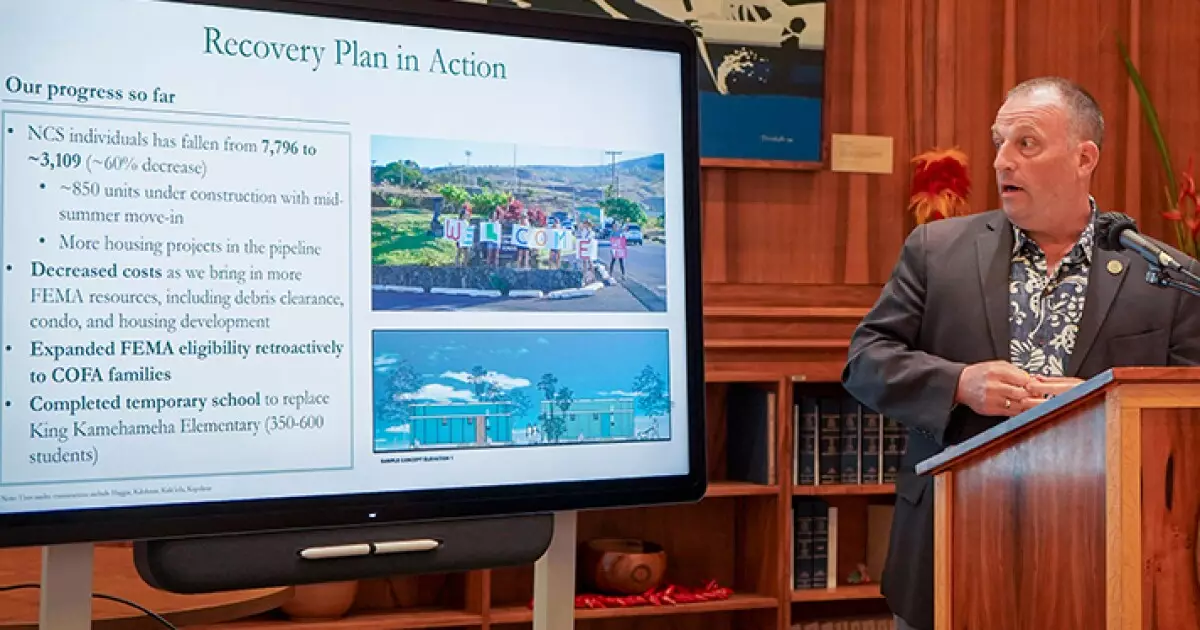Amid criticism from lawmakers for not having a clear housing plan in place, Hawaii Governor Josh Green claims the state is making progress towards reducing recovery costs by transitioning people displaced by fires from hotels to permanent housing. Lawmakers have expressed concerns about the lack of a coherent budget for the costs associated with the Lahaina wildfires on August 8. State Sen. Jarrett Keohokalole warned during a Senate Ways and Means Committee hearing that the wildfire recovery costs could potentially overshadow other budget items, emphasizing the need for the administration to control these costs. Despite these challenges, Green reassured the public during a media briefing that the state will continue to address all of its challenges while working towards effective wildfire recovery efforts.
Hawaii Budget Director Luis Salaveria requested an emergency allocation of $412 million for wildfire recovery efforts during a February 29 hearing with the Ways and Means Committee. The committee approved House Bill 679, which includes emergency appropriations of $297 million for food, shelter, and support services, in addition to the $200 million already allocated for recovery. The state had signed a $500 million contract with the Red Cross to provide food and housing for those displaced by the Lahaina fires, with expenses accruing at a daily rate of $1,000 per family in West Maui hotels. However, challenges arose when FEMA refused to reimburse housing costs for individuals who were already homeless or undocumented. Despite this setback, negotiations with FEMA continue as the number of people eligible for reimbursement grows. The state aims to move all remaining displaced individuals into permanent housing by July 1, demonstrating a commitment to resolving the wildfire recovery situation.
Governor Green proposed addressing Hawaii’s housing crisis by cracking down on illegal short-term rentals. He instructed property owners violating rental laws to offer their units to FEMA or the state for the next two years before selling to local families. Green estimated that 79,000 out of the state’s 89,000 short-term rentals are illegal, with over half owned by non-residents. By rectifying this situation, the governor believes that the state can alleviate its housing crisis. Additionally, he announced plans to allocate FEMA funds to cover emergency and housing costs, including fire debris removal expenses. To manage the financial impact of the wildfires, Green intends to forego a $300 million payment into the Employment Retirement Services fund, reallocating the funds towards wildfire recovery efforts.
Despite the challenges posed by the wildfires, Governor Green assured that Hawaii’s finances remain stable, eliminating the need to tap into the state’s rainy-day fund or reduce essential services. He plans to offset fire-related expenses by adjusting the budget and utilizing available funds strategically. The state’s debt, pension, and Other Post-Employment Benefits (OPEB) liabilities are among the highest in the nation, requiring careful financial management. Hawaii’s credit profile faces long-term pressures due to these liabilities, as highlighted by S&P analysts in a recent report. With ratings of AA, Aa2, and AA-plus from Fitch Ratings, Moody’s Ratings, and S&P, respectively, the state’s financial outlook remains stable despite the challenges posed by the wildfires.
The wildfire recovery efforts in Hawaii present a complex set of challenges, from housing displaced individuals to managing financial implications. Governor Green’s proactive approach to addressing these challenges demonstrates a commitment to resolving the wildfire crisis while maintaining the state’s financial stability. By implementing concrete housing plans, securing emergency appropriations, and leveraging federal funds, Hawaii aims to overcome the aftermath of the Lahaina wildfires and emerge stronger than before.

